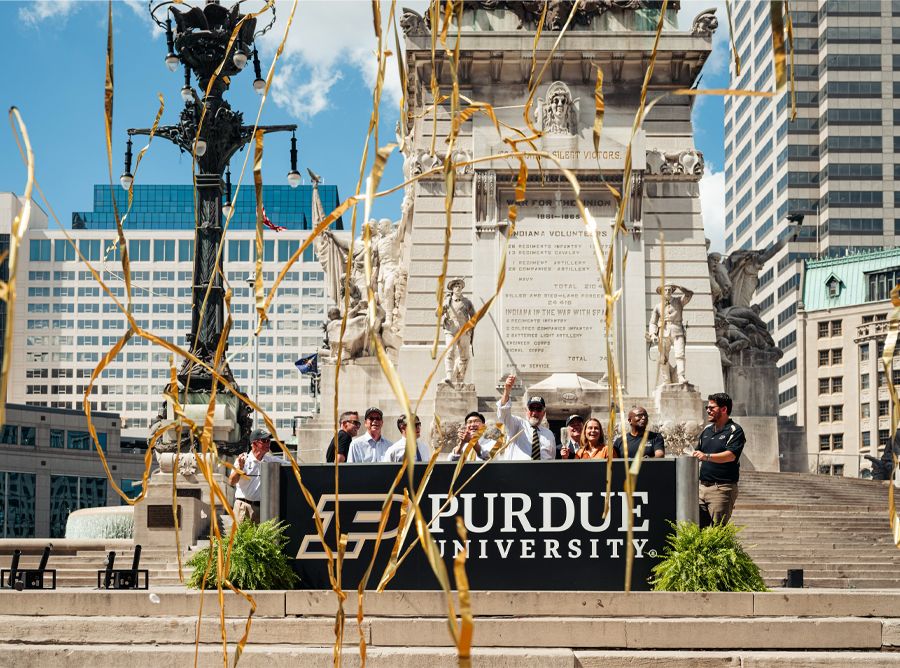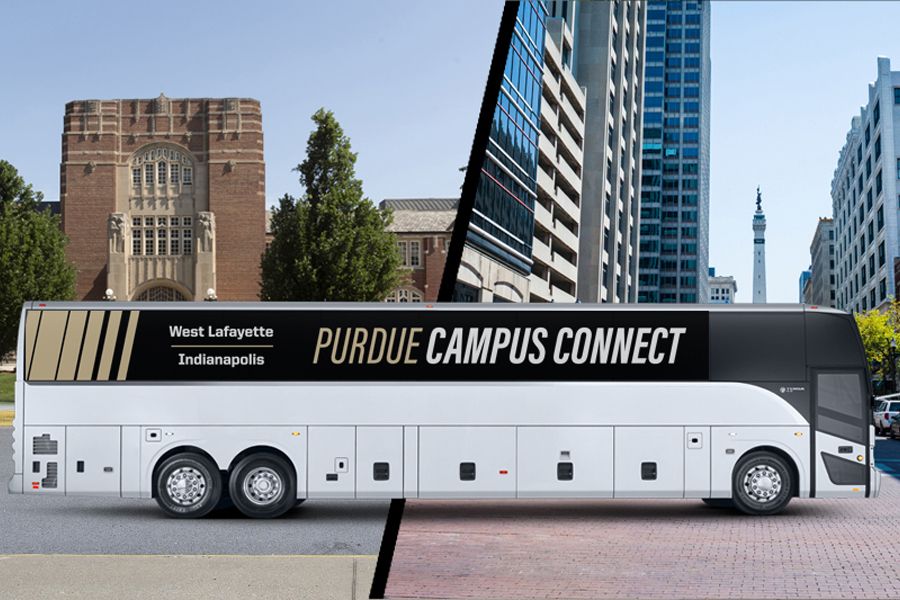BUILDING
THE FUTURE
// By William Meiners (MFA’03)

BUILDING
THE FUTURE
// By William Meiners (MFA’03)

DON’T CALL IT A REGIONAL CAMPUS.
The new Purdue University in Indianapolis, officially launched on July 1, is the university’s first comprehensive urban campus and a direct expansion of the Purdue West Lafayette campus. It promises a seamless transition for both new and existing students while building a distinct Boilermaker presence in the economic heart of Indiana.
This urban expansion follows the dissolution of Indiana University-Purdue University Indianapolis (IUPUI)—likened by many to an “amicable divorce” between the state’s two largest universities. The rebranded campus on Purdue’s side of the street hopes to attract students looking for the college experience in a city setting. Likewise, with a wealth of work opportunities nearby, the business world has been clamoring for a Research 1 university to provide both expertise and the next generation of employees.
Among the architects of the campus and new programming are Daniel Hasler, chief operating officer, and David Umulis, senior vice provost and chief academic officer. Matt Folk (ECE’91), who served as president and CEO of the Purdue for Life Foundation since 2019, was recently named ambassador for Purdue in Indianapolis. All three, well-versed in the challenges of startups and entrepreneurship, speak passionately about the opportunity accompanied by the success and accoutrements of the campus about an hour north on I-65.
SETTING THE PACE
Umulis notes that his role, the highest-ranked academic position at Purdue Indy, helps explain one of the differences between a regional and expansion campus. “There’s also no separate admissions and no differences in diplomas,” he says.
Multiple 55-passenger motor coaches, making six round trips per day and reduced trips over the weekend, will transport students and faculty between campuses. What’s more, those commuters will have “blazing fast Wi-Fi,” Hasler says. “They’re not losing an hour of work.”
Many of the initial offerings for students—including mechanical engineering, electrical and computer engineering, biomedical engineering, computer science, and technology programs—play to particular Purdue strong suits. That focus on STEM education would likewise make those students attractive to a variety of Indianapolis-based companies. The nation’s lone motorsports engineering accredited program, fittingly, will also be offered in the Racing Capital of the World.
Hasler, previously the secretary of commerce for the State of Indiana, helped maneuver the political machinations of turning IUPUI into Purdue in Indianapolis at the behest of former Purdue President Mitch Daniels. Likewise, Umulis, the former Dane A. Miller Head of Purdue’s Weldon School of Biomedical Engineering, has helped cultivate curricula and research programs with business breakthroughs in mind.
Folk returned to his alma mater five years ago to run the Purdue for Life Foundation after selling his own successful semiconductor startup. From fundraising for new buildings to working with industrial partners in Indianapolis, he brings an entrepreneurial spirit to the revamped campus.
Folk looks forward to helping juniors and seniors land internships and co-op positions. Striking a balance between work, school, and life in a fast-paced city, he says, is a primary goal for the Indianapolis campus.
Official numbers will be known soon, but the new freshman class is anticipated to be between 700 and 800 students. Of course, administrators also hope to ease any transitions for existing students already enrolled in Purdue programs.
Academic programs are sure to expand. The newly announced Academic Success Building, set to open in May 2027 at the intersection of West and Michigan Streets, will be the first new building on campus. The mixed-use facility will provide classrooms, labs, and 500 beds for residential use.

ALONG THE HARD-TECH CORRIDOR
Attracting more students who prefer a city setting, along with the two-way street of bringing more qualified interns and co-ops to local businesses, factors into a refitted campus. Additionally, enhanced experiential learning opportunities could prevent brain drain by keeping graduates in the state.
“Indiana colleges and universities punch above their weight in terms of attracting students to campuses,” Hasler says. “But we lose many of them to out-of-state opportunities postgraduation.”
Just as employers get a longer look at students through internships and co-ops, those young people learn more about a place, Hasler says. That familiarity and appreciation for a city like Indianapolis could have more of them making a home there.
Research could be another boon for the business community. “By having this footprint in Indianapolis, we broaden our partnerships with companies who have not formed research relationships,” Hasler says.
Those relationships, in turn, can pay economic dividends throughout the state. The Hard-Tech Corridor, which extends from West Lafayette through a flurry of investments in the Innovation District in Lebanon to downtown Indianapolis, speaks to these possibilities.
Like many educators, Umulis enjoys hearing back from students, perhaps years after a sophomore-level biomedical engineering class, sharing how his course may come into play in their professional day-to-day. Now, with Purdue University in Indianapolis underway, he’s excited to hear stories from these new students in a year or two. Perhaps to hear how their city campus experiences parlay into future success.



